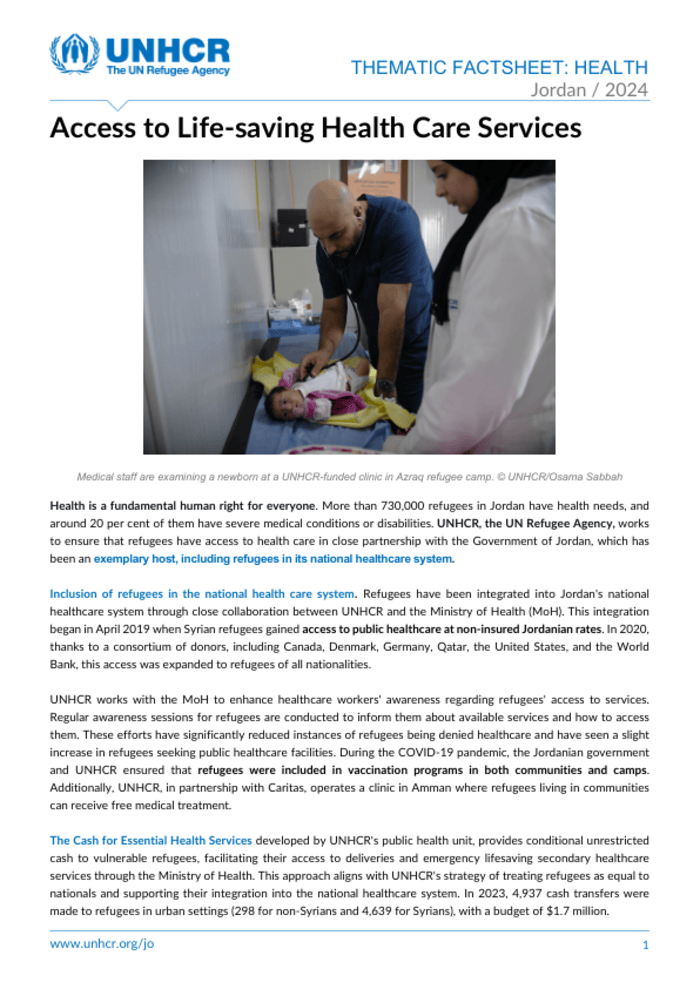
Access to Life-saving Health Care Services
Health is a fundamental human right for everyone. More than 730,000 refugees in Jordan have health needs, and around 20 per cent of them have severe medical conditions or disabilities. UNHCR, the UN Refugee Agency, works to ensure that refugees have access to health care in close partnership with the Government of Jordan, which has been an exemplary host, including refugees in its national healthcare system.
Inclusion of refugees in the national health care system. Refugees have been integrated into Jordan’s national healthcare system through close collaboration between UNHCR and the Ministry of Health (MoH). This integration began in April 2019 when Syrian refugees gained access to public healthcare at non-insured Jordanian rates. In 2020, thanks to a consortium of donors, including Canada, Denmark, Germany, Qatar, the United States, and the World Bank, this access was expanded to refugees of all nationalities.
UNHCR works with the MoH to enhance healthcare workers’ awareness regarding refugees’ access to services.
Regular awareness sessions for refugees are conducted to inform them about available services and how to access them. These efforts have significantly reduced instances of refugees being denied healthcare and have seen a slight increase in refugees seeking public healthcare facilities. During the COVID-19 pandemic, the Jordanian government and UNHCR ensured that refugees were included in vaccination programs in both communities and camps.
Additionally, UNHCR, in partnership with Caritas, operates a clinic in Amman where refugees living in communities can receive free medical treatment.
The Cash for Essential Health Services developed by UNHCR’s public health unit, provides conditional unrestricted cash to vulnerable refugees, facilitating their access to deliveries and emergency lifesaving secondary healthcare services through the Ministry of Health. This approach aligns with UNHCR’s strategy of treating refugees as equal to nationals and supporting their integration into the national healthcare system. In 2023, 4,937 cash transfers were made to refugees in urban settings (298 for non-Syrians and 4,639 for Syrians), with a budget of $1.7 million.
Clinics and a hospital in the refugee camps. In Jordan, while most refugees live in communities, around 130,000 Syrian refugees reside in the Azraq and Zaatari camps. UNHCR plays a crucial role in managing these camps and coordinating health-related activities as the co-chair of the Health sector working group. Within these camps, UNHCR and its partners operate primary healthcare facilities that offer services for acute and chronic diseases, reproductive health, vaccinations, mental health, dental care, nutrition, and pediatrics. Azraq camp also houses a hospital providing advanced medical services like laboratory tests, X-rays, surgeries, deliveries, and pediatric care.
On average, Azraq camp conducts about 5,000 consultations per week, while Zaatari camp handles around 4,300 consultations weekly. When necessary, UNHCR facilitates referrals to external hospitals and clinics. Between January and October 2023, over 5,500 cases from the camps were referred and hospitalized outside, with about half receiving care in public healthcare facilities—a notable improvement from previous years. However, due to limited funding, only life-threatening emergencies qualify for transfers outside the camps. Declining humanitarian funding in Jordan has led some healthcare partners to reduce or withdraw their support from the camps, straining the capacity of the remaining healthcare facilities to meet the increasing healthcare demands of the refugee population.
While UNHCR and the government have continuously supported refugees’ access to healthcare services, challenges remain.
According to the Health Access and Utilization Survey conducted in 2023, many refugees noted increased healthcare costs. Compounded with their dire economic situation, many refugees indicated that they reduced the number of visits to health care providers, spent money from savings, borrowed money, reduced or stopped medications.
Sustainability. Refugee’s access to public health care in Jordan was made possible largely thanks to financial support from the consortium of donors. UNHCR advocates with the donors to continue this support so that the refugees can access public health care at affordable prices. At the same time, noting that the current situation is no longer a humanitarian emergency after a decade, UNHCR is strengthening engagement with development actors so that they can complement and support the health needs of refugees and vulnerable Jordanians.
